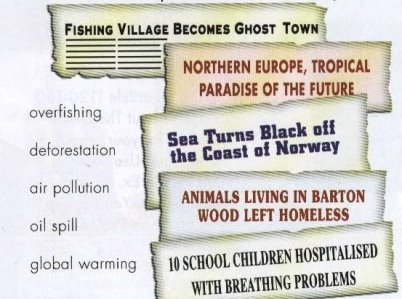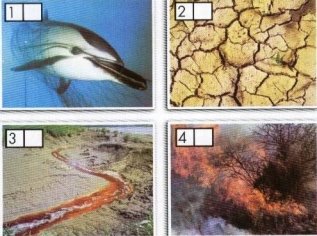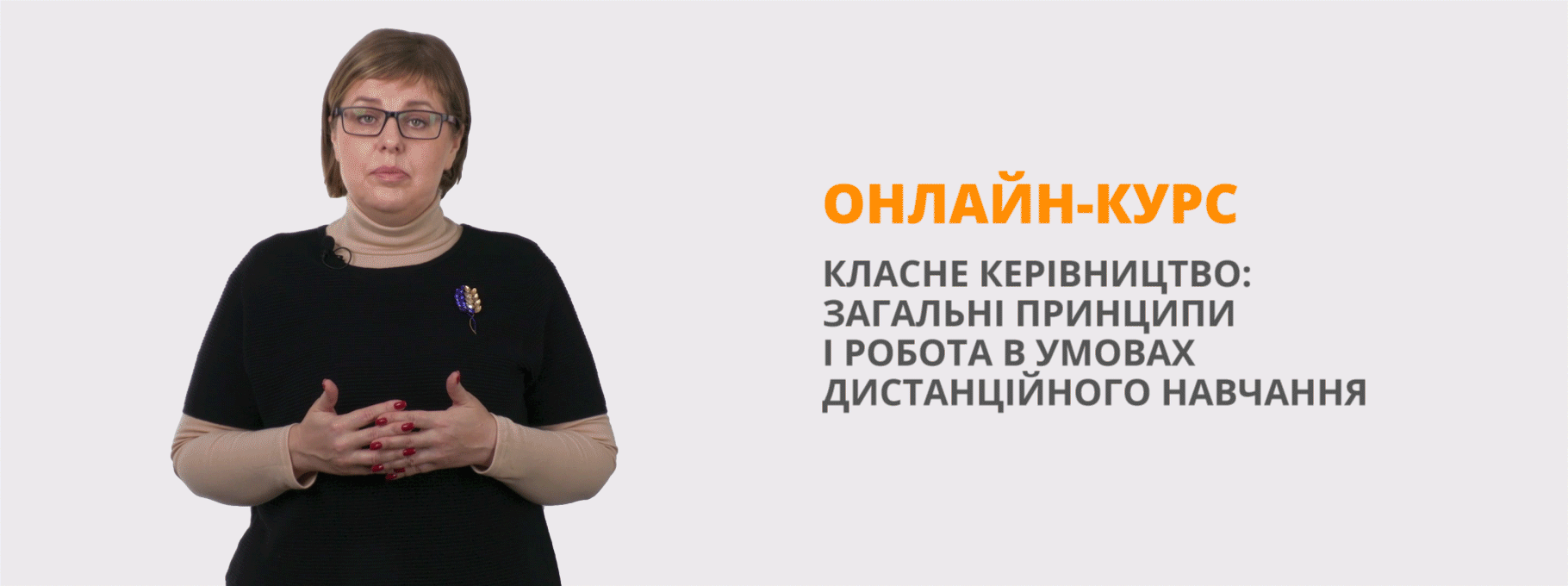Охорона навколишнього середовища
Кукоба Надія Іванівна,
вчитель англійської мови
Слобідської ЗОШ І-ІІІ ступенів
Кагарлицького району
Topic The Environmental Protection
Objectives:
- To activate the vocabulary on the topic.
- To develop pupils’ ability to use new words and expressions in everyday life.
- To develop skills of listening and reading.
- To practice pupils in speaking.
- To use grammar structures in oral speech.
- To stimulate pupils’ thinking and develop their creative imagination.
- To enable pupils to convey their opinion on the topic “ The Environmental Protection.”
- To teach pupils to enjoy the beauty of the world.
Materials: сomputers, the text “ the Problem of Environmental Protection in Ukraine”, the quiz “Are you environmentally friendly?”, the tasks from student’s workbook “Click on 3”,
the computer.
Procedure
I. Warming up.
T.: The topic we are going to study and discuss at today’s lesson is one of the most actual problems of the world - it’s the protection of nature, keeping our environment clean and safe.
We live in a magic world. The world is full of wonderful things. It’s our nature. Nature gives us life. Nature teaches us to be kind and clever, attentive and creative. It teaches us to understand the world around us. We are the happiest people because we can walk along seaside or listen to songs of the forest or of the wind, or of the birds.
T.: Let’s read the epigraph of our lesson.
“How beautiful our blue planet is! How small it is! People of the world, take care of it, protect it’’. Yu. Gagarin
T.: Ecological problems have become global nowadays. You have been learning to speak about nature protection, about ecological problems. To be able to speak and read on the topic you should learn and remember new words and word - combinations. Let’s use our computers.
|
Environment Pollution Environmental pollution To pollute Polluted air Ecology To threaten the nature To protect Protection Ministry of Environmental protection To point out Branch To lessen Closed cycle use To recycle To purify Overpopulated cities Nuclear Waste To throw waste Industrial waste Nuclear waste Radioactive waste Energy To clear rubbish Fertilizers Substances Fuel Spent fuel of reactors Discharge To evacuate To improve the global environment To participate Heritage Greenpeace Forestry Explosion To support Society International cooperation
|
довкілля забруднення забруднення довкілля забруднювати забруднене повітря екологія загрожувати природі захищати захист Міністерство захисту довкілля вказувати галузь зменшувати замкнутий цикл використання здавати на переробку очищати перенаселені міста ядерний відходи викидати відходи промислові відходи ядерні відходи радіаційні відходи енергія прибрати сміття добрива речовини паливо відпрацьоване паливо з реакторів викиди вивозити покращити загальний стан довкілля брати участь спадщина Гринпіс охорона лісів вибух підтримувати суспільство міжнародне співробітництво |
II. Main part
T.: Well, I see you know these words and word - combinations. Let’s continue our work with the text
“The Problem of Environmental Protection in Ukraine “
The protection of nature has become one of the most burning problems of the 21st century. The Earth provides people with mineral resources, rivers, forests, fields - everything that
makes the foundation of industrial and agricultural production. People often do things which pollute land and waters greatly. It's very dangerous because it damages health of the people.
There are a lot of industrial enterprises in our country. Our plants and factories put their waste materials into water and atmosphere and pollute the environment. There are many kinds of transport in our big cities.
The accident at the Chornobyl nuclear power plant in April 1986 caused radioactive contamination of a vast area around the plant. More than 100000 Ukrainian citizens were evacuated from the city of Chornobyl and other areas around the reactor site.
The other problem is an earthquake. We know about some terrible earthquakes in Armenia. Our scientists try to forecast earthquakes.
Millions of years ago animals lived on land, there were lots of trees on the Earth. But now trees as well as the animal world are in danger. They are killed by polluted air and acid rains. Tons of smoke and gas are emitted into the air.
Environmental protection is a great concern of the Ukrainian Government. The Ministry of Environment Protection was founded in Ukraine. Their tasks are to control the state of environment and sources of pollution, to protect the water resources of Ukraine, to extend the network of nature reserves.
The Ukrainian Green Party is very active today. "Zeleny Svit" is the Ukrainian ecological newspaper. It calls on people to protect the nature and to use it in a more careful and economical manner.
T.: a) Pre - reading activities
Match the words and word - combinations with their Ukrainian equivalents.
|
1. the foundation of industrial and agricultural production |
1. аварія на Чорнобильській атомній електростанції |
|
2. the protection of our environment
|
2. основа промислової і с-г продукції |
|
3. the accident at the Chornobyl nuclear power plant |
3. охорона навколишнього середовища |
|
4. an earthquake
|
4. Партія зелених України |
|
5. the Ministry of Environment Protection
|
5. землетрус |
|
6. The Ukrainian Green Party |
6. Міністерство охорони навколишнього середовища |
T.: Post - reading activities
Read and complete the sentences.
1. The Earth provides people with… ( mineral resources, rivers, forests, fields)
2. More than 100000 Ukrainian citizens were evacuated… ( from the city of Chornobyl and
other areas)
3. Our scientists try to forecast ( earthquakes)
4. The Ministry of Environment protection ( was founded in Ukraine)
T.: Say if the statements are true or false.
Let’s prove these statements by reading the sentences from the text.
- Our plants and factories pollute the environment ( F)
- The accident at the Chornobyl nuclear power plant was in April 1985 ( F )
- We know about some terrible earthquakes in Great Britain. ( F)
- “ Zeleny Svit” is the Ukrainian ecological newspaper ( T)
T.: Relaxing minute.
1. Listen to the poem and imagine this situation.
Let's have a relaxation!
Make yourself comfortable!
Close your eyes!
Relax your face, neck, shoulders, arms, back, legs, feet!
Imagine you are at the seaside!
You are alone!
The sun is shining brightly! It's warm!
You feel comfortable and happy!
Imagine: you see a yacht!
It's a very nice yacht with white sails.
The yacht comes nearer and on the top of the yacht you see the letters Rs. What does it mean? It means reduce.
The yacht comes nearer and on the sail you see
the second Rs.
What does it mean?
It means reuse.
And at last you see one more Rs.
What does it mean?
It means recycle
- Test of the Activity Learning
T.: Open your eyes!
T.: Did you imagine the sea and the yacht? P1: Yes, I did.
T.: Have you seen Rs on the sails? P2: Yes, I have.
T.: How many Rs were there? P3: There were three Rs
T.: What do they mean?
P1: - Reduce
P2: - Reuse
P3: - Recycle
T.: Let’s see what you can reduce, reuse, recycle. Read the questions on your individual cards and answer them.
1. Do you reuse old containers?
2. Do you return used bottles for money?
3. When you have a picnic do you leave the place cleaner than
you found it?
4. Do you turn off the tap while you brush your teeth?
5. Do you pick up the garbage you see in the nature?
6. Have you ever given old clothes to someone who needed them?
7. Do you turn off the light when you leave the room?
8. Have you ever planted a tree?
T.: Work in pairs.
Let’s make up rules about using natural resources. Each group fills the gaps and explains what we must or mustn’t do with our nature.
1. We ….. pollute rivers. (Mustn't)
2. We ….. use only unleaded petrol. (Must)
3. We ….. recycle paper, glass. (Must)
4. We ….. create so much rubbish. (Mustn't)
5. Wе ….. destroy rainforests. (Mustn't)
6. We ….. protect wildlife. (Must)
7. We ….. drop litter on beaches. (Mustn't)
8. We ….. let factories pollute air. (Mustn't)
T.: Let’s do some exercises from student’s workbook “ Click on”
Match the headlines to the problems , then ask and answer questions, as in the example.

A: Why has the fishing village become a ghost town?
B: Because of overfishing.
A: Why will Northern Europe become tropical paradise of the future?
B: Because of global warming.
A: Why was sea turned black off the coast of Norway?
B: Because of oil spill.
A: Why did animals living in Barton wood leave homeless?
B: Because of deforestation.
A: Why have 12 school children been hospitalized with breathing problems?
B: Because of air pollution.
T.: Match the problems to the pictures.
A drought (2) C endangered species (1)
B forest fires (4) D industrial waste (3)

T: Underline the correct word.
1. The ozone layer is being contaminated / damaged by the use of aerosols.
2. Zoos help to preserve threatened / endangered species.
3. Deforestation is destroying / polluting the forest.
4. Factories should not be allowed to pump industrial waste /greenhouse gases into rivers,
lakes or seas.
5. Global warming is caused by heat dumped / trapped in the atmosphere
T.: What are the following threatened by?
elephants a logging companies
rare plants b hunters
fish c aerosols
forests d waste and sewage
the ozone layer e acid rain
P1.: Elephants are threatened by hunters.
P2.: Rare plants are threatened by acid rains.
P3.: Fish is threatened by waste and sewage.
P4.: Forests are threatened by logging companies.
P5.: The ozone layer is threatened by aerosols.
T.: Let’s do the personality quiz
“ARE YOU ENVIRONMENTALLY FRIENDLY?”
It is personal action that will help preserve the world's environment. Actions, which are simple and quick. There are many actions each person can take every day. Try this test to know if you are environmentally aware.
Each positive answer gives you one point, each negative answer gives you a zero.
You:
1. Would rather walk or ride a bike than use means of transportation.
2. Turn off light and other electrical equipment when not in use.
3. Take shorter showers to save water.
4. Write on both sides of paper to save trees.
5. Put on more clothing in winter instead of turning up the electric heater.
6. Buy products that are recycled, recyclable, reliable, repairable, refillable,
reusable.
7. Try to cook several meals at a time.
8. Repair leaking taps.
9. Use mugs or glasses instead of paper cups.
10. Make sure the refrigerator door is fully closed.
11. Use the clothes line rather than a dryer.
12. Use energy efficient light bulbs.
13. Do not pour oil, fat, milk, chemicals down the sink.
14. Do not drop litter around.
15. Look for opportunities to reduce trash.
16. Reuse bags, containers, paper, boxes and other items.
17. Select products with the least wasteful packaging.
18. Buy, sell or donate used goods such as clothes, furniture or appliances.
19. Encourage your friends to be environmentally friendly.
Count your score and analyse the results.
16 - 19: You definitely think globally and act locally. Good for you.
11 - 15: You are quite environmentally friendly but there are actions you
can take to be more environmentally aware.
Less than 11: You could be characterized as a person who doesn't make an
effective and positive contribution to the environmental protection.
You forget that this is the world for you and your future children to
live in. Try not to be so indifferent to the world's environment. Learn
how to preserve it.
III. Summing up
T.: Dear pupils! Our lesson is over. You have done a lot of work. And your answers were correct. I think you have understood how important is to solve the environmental problems. If we can be active participants in the protection and rebuilding of our environment we can help our planet to survive and keep it healthy for future generation. Everybody on the Earth must think of saving our planet before it isn’t too late.
T.: Let’s listen to the poem
P1.: Do all the good you can,
By all the means you can,
In all the ways you can,
In all the places you can
At all the times you can,
To all the people you can,
As long as ever you can
T.: What have you learned today at the lesson?
What activity do you like the best?
IY. Home work
T.: Your homework is to write a newspaper article on the topic “The Earth is our one and only home”
Resources
- Типова освітня програма закладів загальної середньої освіти ІІІ ступеня. 2018р.
- Методика навчання іноземних мов у середніх навчальних закладах: Підручник (кол. авторів під керівн. С.Ю Ніколаєвої. - К: Ленвіт, 2002.)
- Англійська мова. Дидактична мозаїка. 11 клас. - Харків: Веста: Видавництво «Ранок», - С. 230-231
- Машкіна В.П. Блок уроків з теми: «Навколишнє середовище». // Англійська мова.
- 2010. - №6. - С. 23-24
- Скляренко Н.К. Сучасні вимоги до вправ для формування іншомовних мовленнєвих навичок і вмінь. //Іноземні мови. - 1999.-№3-с.3-7)
- Чекало Г.С., Коваль Т.І. Зворотний зв'язок як засіб управління навчально - пізнавальною діяльністю студентів у комп’ютерних вправах з іноземних мов //Іноземні мови. - 2005. - №3.-с.29
7. Oksana Karpyuk. English, 11 - T.: 2019. - С.255
8. Virginia Evans - Neil O’Sullivan. Click on 3. Workbook Student’s, Express Publishing.
2001. - C. 42


про публікацію авторської розробки
Додати розробку
